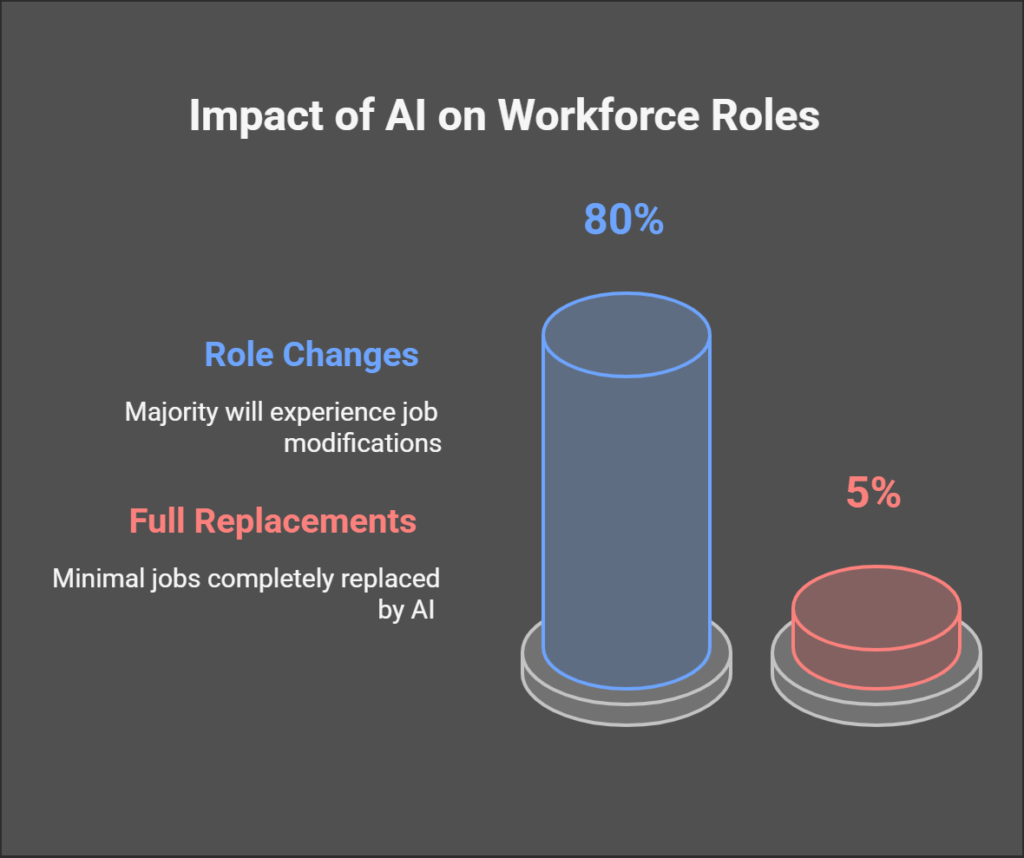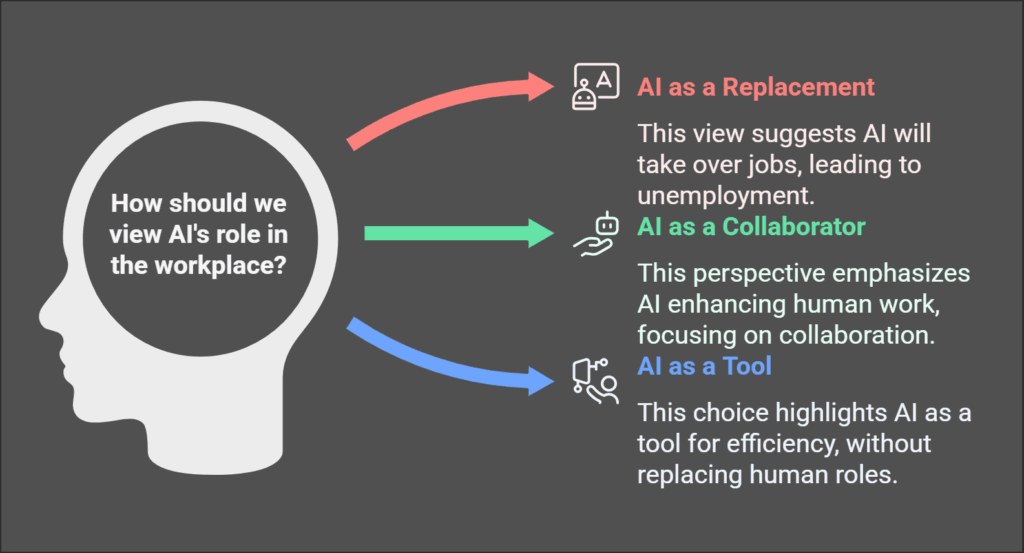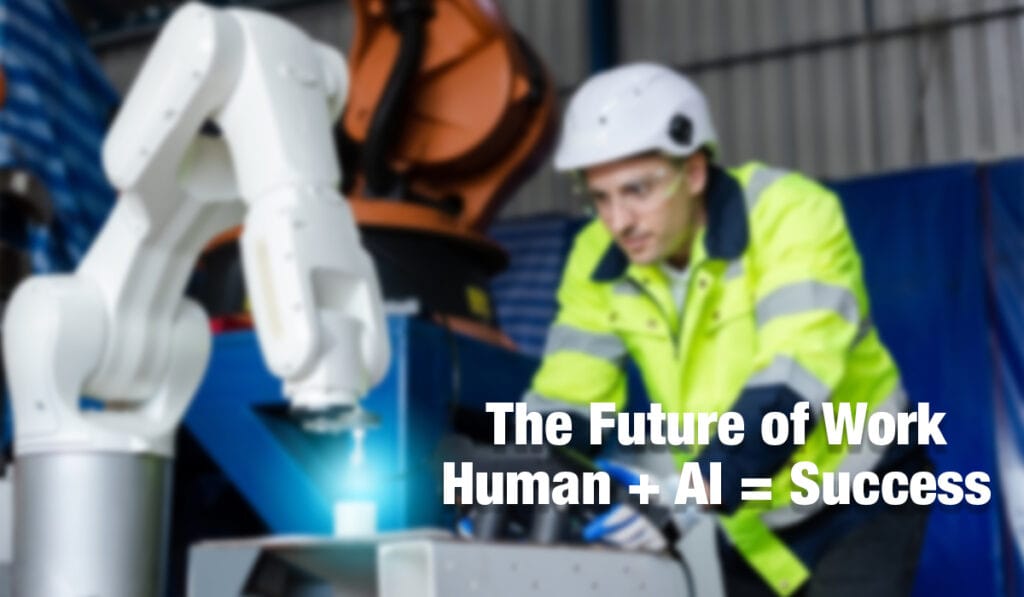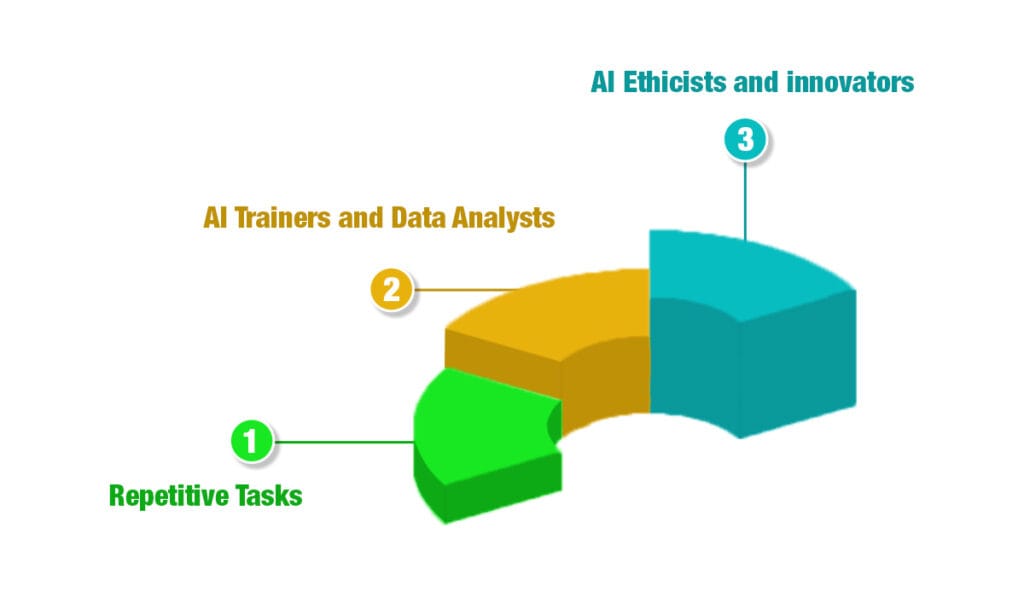AI’s Job Takeover? Or Just a Hype?
When it comes to AI and jobs, the buzzword on everyone’s mind is: “Will AI take over my job?” And let’s face it — it’s a bit scary. After all, we’ve all heard those stories about robots and machines doing the work humans used to do. But hold up, before we start packing up our desks, let’s take a closer look at this whole “AI job takeover” situation.
Spoiler alert: It’s not as bad (or as simple) as it seems.
The Truth Behind AI and Jobs: It’s Not the End, Just a Shift
First, let’s put this fear (Is AI Taking Over Jobs?) to rest: AI isn’t here to steal your job, it’s here to help make your job better! While AI can handle repetitive tasks (think about those boring data entry jobs), it’s actually creating opportunities for humans to do more of the interesting, creative, and decision-making work. In fact, AI is like your new best coworker — it does the stuff you’d rather not do, so you can focus on what really matters.
Curious about what AI really is and how it works? Don’t miss out—read our blog now and uncover the true power of AI!For instance, imagine you work in customer support. AI-powered chatbots can quickly answer routine questions, but you, the human expert, are still needed for the tricky stuff, like dealing with irate customers or providing personalized recommendations. AI isn’t replacing people, it’s enhancing their roles by taking over the monotonous tasks.
The Numbers Don’t Lie: Jobs Are Evolving, Not Disappearing
Some jobs will indeed evolve with AI, but mass unemployment? Not quite. A recent study from McKinsey shows that while AI might automate up to 50% of current tasks, only around 5% of jobs will be fully replaced. The key word here is evolving. Many roles are transforming, requiring workers to develop new skills to work alongside AI. For example, a data analyst’s job may now involve collaborating with AI systems to interpret data, rather than simply collecting it.
Stats You Should Know:
- 80% of workers are expected to see their roles change due to AI, but only 5% will be fully replaced.
- AI’s impact on the workforce will be more of an enhancement, rather than a total replacement, according to Forbes and Harvard Business Review.

The Fear of Unemployment
We get it. Change is scary. And no one likes the idea of being replaced by a machine. But here’s the thing: AI is a tool, not a competitor. It’s about working smarter, not harder. If you’re in a job that involves repetitive tasks, AI might just be the upgrade you need. For example, think about accountants. Instead of manually entering every receipt into the system, AI can automatically process invoices, leaving accountants to analyze financial trends and provide strategic advice. The human touch is still essential!
Why AI Will Never Replace Human Creativity
Sure, AI can calculate, analyze, and predict. But there’s one thing it can’t do: be human. AI still lacks the creativity, empathy, and emotional intelligence that humans bring to the table. The future of work will likely involve humans and AI collaborating to do what each does best. And that’s a pretty exciting prospect, right?
We here breaking down these myths and making it clear to you that AI is here to help, not hinder. So, let’s embrace it and prepare for the future of work — smarter, better, and more human!
AI Will Steal Your Job… Or Will It?
We’ve all heard it: “AI is going to take over everything!” But is it really as dramatic as it sounds? Sure, AI is fantastic at automating repetitive tasks, but let’s get one thing straight — AI isn’t here to replace humans; it’s here to work with us.
Take healthcare, for example. AI tools are amazing at analyzing massive amounts of patient data, spotting patterns, and making predictions, but doctors are still very much in charge of making the final decisions. The human touch is irreplaceable, especially when it comes to patient care. After all, you wouldn’t want a robot to be the one holding your hand during a difficult diagnosis, right?
AI is transforming healthcare in incredible ways! Discover how AI is revolutionizing medicine—read our blog on AI in healthcare now!In marketing, AI helps businesses analyze customer data and create personalized ad campaigns. It can target the right audience at the right time, but humans are still needed to get creative with the messaging, build relationships, and add that personal flair. The power of storytelling and emotional connection still lies with people, not machines.
Want to see how AI is revolutionizing marketing? Explore our blog now to learn how AI boosts customer engagement, personalization, and ad targeting!And let’s not forget about customer service. Chatbots and AI-driven customer service tools are great for answering basic questions and handling routine requests, but when the issue gets tricky, it’s time to hand it over to the human expert. AI is there to enhance efficiency, not to take over entirely.
So, while AI does make certain tasks more efficient, it can’t replace the creativity, empathy, and critical thinking that humans bring to the table. Instead, AI healthcare jobs, AI marketing jobs, and AI customer service automation are about collaboration — humans and machines working together for a better, more efficient future. Think of AI as your new assistant, not your replacement.

Is AI Only Coming for the “Easy” Jobs?
You’ve probably heard the myth that AI is only coming for low-skilled jobs — like cashiers or factory workers. But here’s the truth: AI isn’t just targeting the “easy” jobs; it’s actually creating new, high-skill opportunities!
While AI can automate routine, repetitive tasks (think of robots in factories or chatbots answering customer queries), it also opens up new careers that require creativity, problem-solving, and emotional intelligence. AI job opportunities are rapidly growing in fields like data analysis, AI training, and even AI for skilled professionals who can develop, maintain, and improve these systems.
Take finance, for example. AI tools can analyze huge datasets, making sense of complex financial trends faster than any human. But that doesn’t mean the finance professional is out of a job! Instead, they’re now freed up to focus on strategic decision-making and using their expertise to interpret the results. That’s where creativity and problem-solving come in!
Unlock the power of AI in finance! Dive into our blog now to see how AI transforms financial decisions, investments, and security!If you’re wondering where you fit in the AI revolution, here’s the exciting part: AI training careers are booming! There’s a growing need for professionals who can teach AI systems, help refine algorithms, and ensure that these tools are ethical and effective. Plus, roles involving emotional intelligence, like customer relations or team leadership, are only going to become more valuable.
So, instead of thinking of AI as a job-stealer, think of it as a job-creator that brings new challenges and higher skillsets into the mix. It’s time to embrace the future!
Is AI Just for the Big Players?
Think AI is reserved for huge corporations like Google or Amazon? Think again! AI is now more affordable and accessible than ever, and it’s making waves in small businesses and startups.
Gone are the days when AI tools were exclusive to tech giants with deep pockets. Small businesses can now tap into AI for a variety of functions like customer support automation, targeted marketing, and even inventory management—at a fraction of the cost. For instance, tools like chatbots can handle customer inquiries 24/7, freeing up staff to focus on more complex tasks. Email marketing platforms powered by AI can send personalized messages to customers, boosting engagement and sales with minimal effort.
And it doesn’t stop there! AI for startups can streamline business operations, manage data, and optimize processes—helping smaller companies compete with the big players. For example, a small retail shop could use AI to track inventory levels, predict product demand, and optimize pricing, ensuring they never run out of stock or overstock products.
Want to discover the best AI tools for small businesses? Check out our blog now and learn how AI can drive growth and efficiency!So, if you’re running a small or medium-sized business and haven’t yet tapped into AI, you’re missing out! The tools are out there, and they’re affordable AI tools that can help you scale smartly.
The Future of Work: Human + AI = Success!
Gone are the days when people feared AI would take over jobs entirely. The truth? AI isn’t here to replace us—it’s here to collaborate and make our work better!
AI is set to augment human capabilities rather than replace them. Imagine this: AI handling repetitive tasks or sifting through massive datasets, while you, the human worker, focus on the creative, strategic, and problem-solving aspects of the job. It’s a match made in productivity heaven!
For example, in the manufacturing industry, AI-powered robots handle dangerous or mundane tasks, like assembling parts or carrying heavy loads. Meanwhile, humans oversee these robots, stepping in for troubleshooting, managing production, and solving complex problems that require critical thinking. This collaboration boosts efficiency, safety, and allows human workers to focus on higher-value work.
As jobs evolve, new roles are emerging that require human+AI collaboration skills. Employees will increasingly need to understand how to manage AI tools, integrate them into business processes, and leverage their capabilities to drive innovation.
AI and humans working together is the future of work—we amplify each other’s strengths. Embrace the change, because in the end, it’s not about competing with AI, but thriving alongside it.
Real-World Example:
- Manufacturing: AI robots handle repetitive tasks, while humans oversee and make strategic decisions, ensuring safety and quality control.
The key takeaway? AI is here to collaborate, not compete. The future of work is a partnership, and it’s a partnership that’s already happening.

AI’s Role in Creating New Job Opportunities
“Is AI Creating Jobs? Absolutely!”
AI isn’t just a job-stealer—it’s actually a job creator! While we often hear about AI replacing certain roles, the truth is that it’s also opening up entirely new job opportunities that didn’t even exist a decade ago.
From AI trainers to data analysts and AI ethicists, there’s an exciting wave of new roles emerging as AI becomes a more integral part of industries across the globe.
- AI Trainers: These professionals teach AI systems how to recognize patterns, make decisions, and function correctly. It’s like training a robot to understand human behavior!
- Data Analysts: With the massive amounts of data AI collects, companies need data analysts to interpret that data and make decisions that drive business strategy.
- AI Ethicists: As AI continues to evolve, the demand for professionals who can ensure AI is operating ethically and responsibly is skyrocketing. AI ethicists make sure these systems are transparent, fair, and free of bias.
Real-World Example:
- Healthcare Industry: AI ethicists are ensuring that algorithms used in diagnosing diseases do not favor one group over another and that data privacy is upheld. Meanwhile, AI trainers are teaching these systems to improve accuracy over time.
The fact is, AI is shaping new careers that require unique skills, creativity, and critical thinking. And guess what? The AI revolution isn’t just a job killer—it’s a job creator!
Embrace AI, Don’t Fear It!
AI is not a job threat—it’s a career opportunity waiting to happen! Instead of fearing AI, it’s time to embrace it as a tool to boost your career. The future of work isn’t about being replaced by robots; it’s about collaborating with them to unlock new career paths and possibilities.
AI is not a force to be feared but rather a tool that can amplify your skill set and help you stay competitive in an ever-evolving job market. Whether you’re ups killing in data analysis, learning how to manage AI tools, or venturing into emerging fields like AI ethics, there’s a world of opportunity waiting for those willing to adapt.

Why Adapt to AI?
- Stay Relevant: Adapting to AI is crucial for long-term career growth. As industries continue to integrate AI, being tech-savvy will become a vital skill.
- New Career Opportunities: AI is not just about automation; it’s creating new roles like AI trainers, AI ethicists, and AI specialists.
- Growth & Innovation: With AI by your side, you can shift focus from routine tasks to higher-value, creative, and strategic roles that require human intuition, emotional intelligence, and critical thinking.
The future of work is about humans working alongside AI, not against it. So, let’s step into this exciting future together!